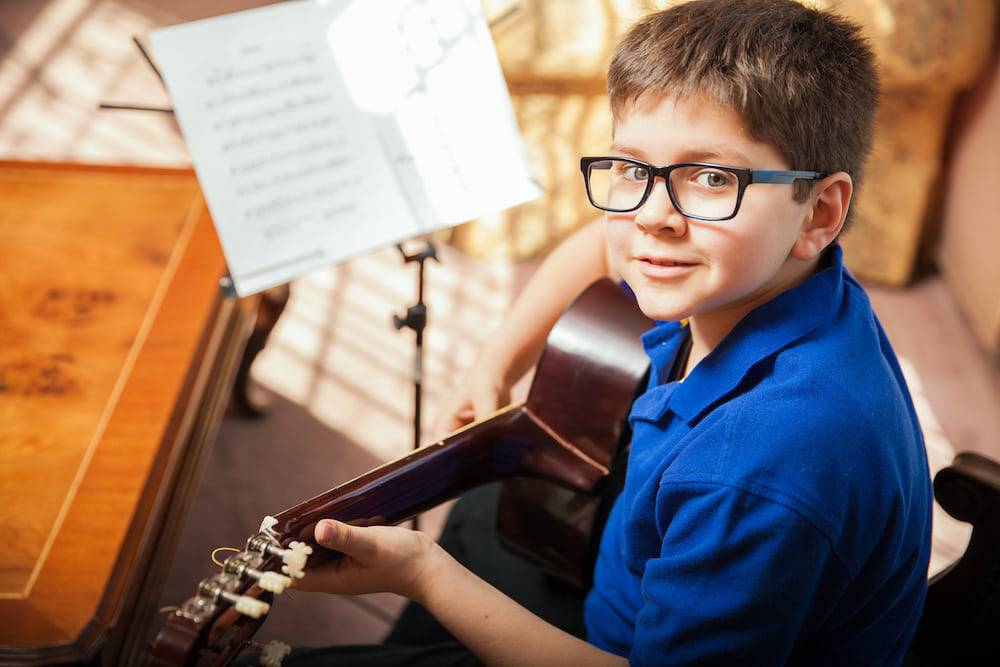5 Tips for Making Music Practice Fun for Your Child

No matter how passionate your child is about music or their chosen instrument, they are sure to face bouts of disinterest or even burnout from time to time. This is especially true depending on your child’s age. Often younger children have shorter attention spans and can be prone to lacking the discipline necessary to stay on top of their lessons and private practice at home. As a parent, this can understandably feel frustrating!
However, don’t worry! There are things you can do to help your child stay on track and get the most out of their private practice at home. After all, it is supposed to be something they enjoy and look forward to rather than dreading.
Continue reading to discover our five tips to help motivate your child with their music practice!
Tip #1: Keep practice short, sweet, and goal-oriented.
Here at Music House, we recommend that our students practice at least 20 minutes each day. While this is a pretty manageable amount of time, for kids, even 20 minutes can feel like an eternity if they are faced with a task they aren’t looking forward to. Couple this with any stress or expectations from school, friends, and other activities, and you might have a recipe for disaster or worse - a meltdown.
If something like this is going on, make sure to keep practices right at 20 minutes as well as come up with a goal system. For example, encourage your child to set a goal, such as playing through their piece without making any mistakes. When they do this, they will feel an immediate sense of accomplishment and pride. This will encourage them to keep going. Plus, having bite sized tasks like these will help the time go by faster and keep them free from distractions.
Tip #2: Be a source of encouragement.
When your child is taking face to face or online classes for kids, their instructor is right there providing feedback and encouragement in real time. Words of affirmation are a very important part of helping your child feel motivated to keep practicing, especially in the face of hiccups or mistakes.
When starting a practice session, also be mindful of what language and tone you use. Rather than saying something like ‘well tough it up and get started’, opt instead for a softer approach. Learning music is very hard, and parents need to be the biggest cheerleaders for their child. When they play a piece well or their posture is spot on, praise them for it! If they hit a snag in their piece, talk it out and be positive.
Tip #3: Make time for fun.
One of the quickest ways to push your child into burnout is to have them play the same piece over and over again, especially when they keep making mistakes or fumbling through notes. Sometimes, the best thing you can do is set the piece aside and take a breather. Once that frustration settles in, it can be difficult to shake, putting a damper on the whole practice session.
Instead, make time for something fun! Is there a pop piece your child has been wanting to try? What about their favorite song from the radio? Switching into a piece they really enjoy or know that they play well can give them a much needed confidence boost and serve as a palate refresher. Or you could always talk to their instructor about some fun exercises that can help them work out any kinks or roadblocks that might pop up during practice.

Tip #4: Encourage experimentation.
Following the rules is a good way to learn the fundamentals of any instrument. You need to have a solid grasp on these in order to produce quality music. However, once these are down, it’s perfectly fine - encouraged, in fact! - to branch out and experiment. Things such as posture and breath support are two non-negotiable elements, but there are still other ways you can encourage your child to follow their curiosities.
In fact, this is a great way for your child to establish their own personal style. Following music verbatim as it’s written is important, but so is the freedom to have fun and be creative. So if your child has been wondering ‘what happens if I…?’ let them find out! Whether the end result is good or bad, it will pave the way for an improved musician.
Tip #5: Be mindful of time and place.
Children thrive under routine. One of the best ways to ensure a fruitful practice session is to find what works best for your child and then stick to it. For example, do they do best after school, or are they still too keyed up from the day to focus? Or would after dinner be a better choice, so they have a full belly and an improved mood?
Also, do your best to remove any distractions from the room, such as turning off the TV or silencing cell phones or tablets. If you have other children who live at home, ask them to be respectful of their volume and to give the child practicing music their space, at least for the designated 20 or so minutes needed to practice.
Each child is different and there is no right or wrong answer to what their routine looks like or what their needs are. What matters the most is that your child is attentive, focused, and ready to apply themselves once they sit down to practice.
Wrap Up
Learning any type of instrument is difficult regardless of age. It can even be a huge struggle for adults! That is why it is imperative to remain patient with your child as they navigate through obstacles such as burnout, lack of motivation, and overall just feeling discouraged. Provide support and encouragement every step of the way, similar to what they would receive while in face to face or online music classes for kids. Give them space to make mistakes as well as try new things. Be a sounding board for their fears and struggles. With these things in mind, you’re sure to help your child master their chosen instrument.

